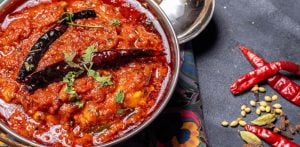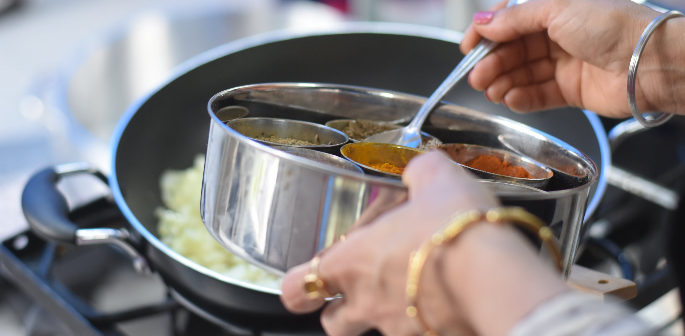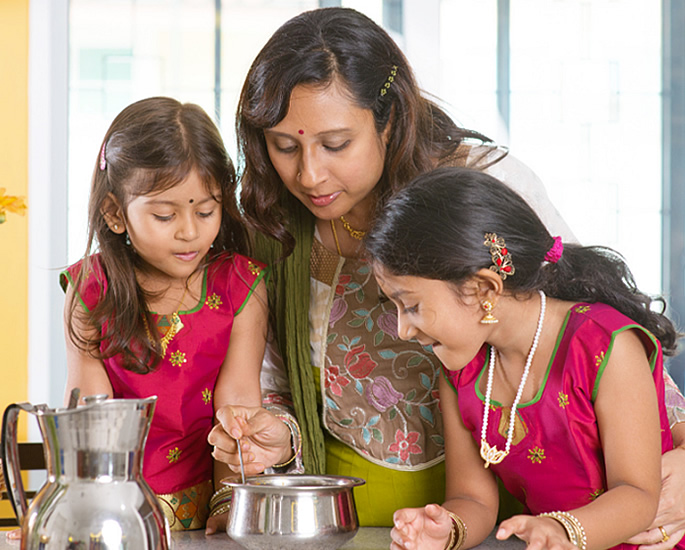“Women are stereotyped to be able to cook food"
In South Asian culture, food is very important and traditionally it has been the job of South Asian women to do the cooking.
This typical and outdated gender role is not exclusive to South Asian culture but is a worldwide issue.
Much of the world has moved on from this view, with the concept ‘gender roles’ in general, slowly becoming extinct.
However, it seems that many South Asians have clung to this traditional belief.
But is this traditional belief the right way forward?
Are we holding the Desi community back by clinging onto this belief?
Many of the world’s best chefs are in fact men, why is this not being reflected in homes?
Many South Asian women are rejecting this so-called responsibility of theirs to cook for their family. But why?
Upbringings
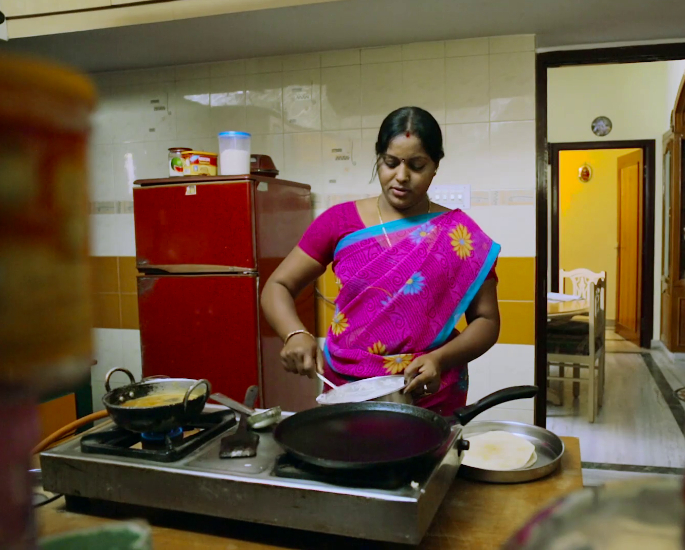
Many South Asian women grew up hearing that it was solely their responsibility to cook in the home. Thus, they may have been taught from a young age.
Mo, from Brighton, says:
“Food is so entrenched in South Asian culture that it is surrounded in stereotypes as well as being a social pleasure.
“Women are stereotyped to be able to cook food, serve food, offer to feed people all the time.
“And then these stereotypes are further enforced by people outside of South Asian culture. We are asked for recipes and about food and people expect us to know how to cook.
“I always felt pushed into the stereotype of having to learn to cook and then cooking for family gatherings. I rebelled against it as a teenager. It was only when I went to university that I wished I had learned to cook.
“Surely, we should have a choice? And people should not presume that we are all traditional women who spend our time cooking?”
On the other hand, many South Asian men have been raised to believe that it is not their responsibility to cook in the home.
Men may be mocked if they suggest that they cook instead of the women.
They may be viewed as being feminine rather than masculine because the community associates cooking with femininity and women.
The Desi communities’ reservations towards the switching of gender roles are very much controversial, to say the least.
Thus, a cycle is created, with Desi men believing they should not cook, and Desi women believing they should.
The truth is, there is not a set responsibility when it comes to cooking, nor should there be.
Cooking is a basic life skill. Everyone, irrespective of gender, should know how to cook.
We should alter the values that are being instilled in children from a young age since they are quite impressionable.
The learning of cooking should be a choice, based solely on the fact that one is interested in learning to cook. And nothing else.
Mohammed Salim says: “So I’m only talking as a British Indian male but as far as I’m aware and have seen, it’s a tradition in every south Asian family that the mother teaches the daughter to cook and then that daughter then teaches her daughter etc. and therefore it became tradition.
“Well, shouldn’t that legacy continue? That is our culture. If people want culture to continue then legacies such as that should too.”
The Duty of Wives & Daughters
For some, learning to cook is vital if you are a woman.
This is so that many can be what is considered as a “good” daughter or wife.
For years, many South Asian women have been taught that they must do what senior men in their families tell them.
This also includes their husbands.
This duty to learn how to cook is perhaps with the purpose of carrying out this role.
The “bad” wife and daughter is the one who does not cook or do as they’re expected.
They are looked down upon, seen as not being caring towards their partner and being disrespectful to their parents.
Refusal to cook can lead a woman’s character to be judged by others in the community.
“What kind of wife is she?”
“She doesn’t love or respect him; she does nothing for him.”
They say this, while they ignore the many sacrifices she has made.
She left her parents to live with her husband. She may have left her job, which meant everything to her, to look after the children.
All while she emotionally supports her husband.
But no, the minute she refuses to cook food or has a day where she feels too tired to do it, she is a bad wife.
Is this fair?
Marriage
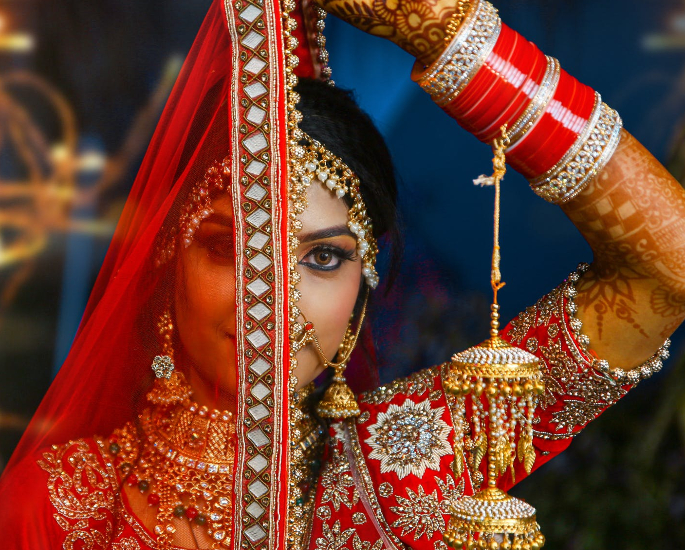
Does the community view South Asian women as unmarriable if they lack the ability to cook?
Sadly, in most cases, the answer is yes.
The ability to cook is quite an important factor for Desi women when it comes to marriage, and it’s what a lot of men look for.
Once again, the matter at hand is about a woman’s upbringing and whether she was raised right.
If she cannot cook, most of the time her mother is viewed as not raising her in what the Desi community regards as the right way.
If she can cook, she has very much sold herself quite effectively and has ticked many boxes.
Manav from Solihull says:
“I think they should [know how to cook] because cooking is a life skill but in order to promote gender equality, men should be taught to cook too.
“But in any culture (not just South Asian) cooking should never solely depend on women but for the independence and the flexibility that cooking provides, South Asian women should know how to cook.
“But it’s not essential for them.”
Many young women who know how to cook seem to have emerged themselves into the ‘wifey material’ idea.
It’s an idea that once again resonates with the point that you are able to be a ‘good wife’ simply because you can cook.
Meena from Luton says:
“When I was looking for a marriage prospect, I remember, the one question that came up most was ‘can you cook?’.
“When I used to answer ‘No. But I can boil an egg.’ with some laughter as a joke. A good few men I met did not find it amusing.
“When I would say ‘Yes, actually I can.’ I would see a pleasing look appear on their faces.
“As for my choice, it was my husband who was the only guy that had no issue with me not being able to cook.”
Therefore, Desi marriage is still one area where for many men and their families, a bride-to-be being able to cook is still seen as a desirable and much-wanted attribute.
Comparisons
Young Desi girls tend to face a lot of comparisons, often from within the family or relatives.
“Her daughter can cook, why can’t you?”
They may be down looked if they cannot cook. Like they lack a certain quality.
If someone raises this issue, parents tend to feel attacked. It is almost as though their upbringing is being attacked.
Is this a question of the ability to cook or one’s upbringing?
There are a lot of Desi girls and young women being allured by education and chasing successful careers.
Hence, cooking is not always on top of their list.
In addition, parents try to accommodate this by not pressuring them to cook.
So, meals are usually cooked for them with cooking being something they should learn rather than a must.
In comparison, no young Desi man is going to get such an issue raised against them. It’s completely acceptable if the man cannot cook or cooks when ‘he feels like it’.
Being a Desi Woman
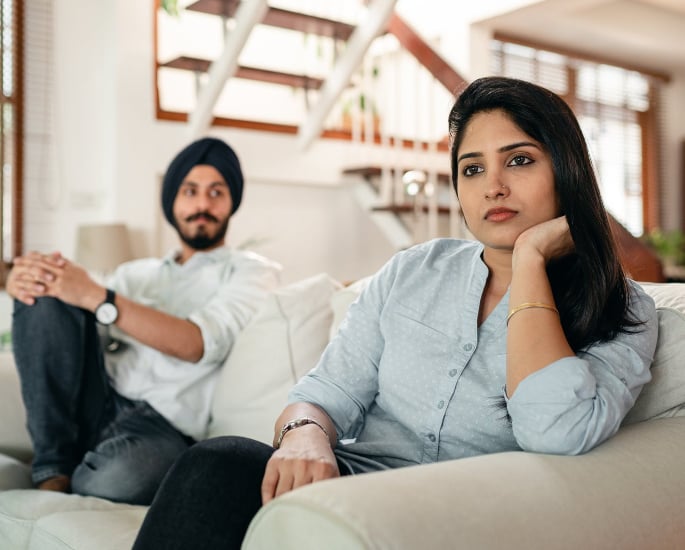
It is unfortunate that throughout much of the Desi community South Asian women who cannot cook are viewed as less than those who can.
In the community’s eyes, they have failed as women.
They have not fulfilled their responsibilities. They have not achieved the one thing that makes them a woman.
This isn’t just exclusive to the Desi community, much of the world still thinks in this way.
Drew from Essex says:
“When I was at university, I lived with my two best friends, one a girl and one a boy.
“My girl best friend is of an Indian heritage and would always push to make the meals in the flat.”
“Other times it would be me making the meals, and rarely it would be my boy best friend as he simply did not care what he ate and toast for dinner would suit him.
“But the push from my girl best friend shocked me somehow because she has been taught that a woman should always do the cooking, unless it’s a special occasion.
“Then the males get to bring out their big ‘signature’ dishes.
“Women should know how to cook if they want to know how to cook.
“It shouldn’t be shamed upon if a woman doesn’t know how to cook intricate dishes over sticking something frozen into the oven.”
For Desi women, ticking the box of being able to cook should be something that is ‘naturally’ expected.
But with time being divided between studies, work and having a social life, for many young Desi women this skill is dwindling.
Saima from Birmingham says:
“I am the youngest of three sisters. My elder sisters were married young and learned to cook from my mother.
“I’m the one who went on to study. So, with time being consumed with my studies and a part-time job. I have not had time to learn.
“My mother makes all the meals and does say I should learn but realises my life is very different from hers and that of my sisters.”
Neelam from Leicester says:
“When I was young the main person who cooked in our house was my dad. My mother did everything else.
“He used to love making different dishes for us. They were amazing and tasty.
“So, for me seeing this growing up, this was ‘normal’ but when I went to Uni study I found out it definitely was not.
“A lot of the Asian guys would laugh at me and say you’re going to be such a ‘bad wife’ Neelam. Best you learn it!”
“This used to kick-off arguments between me and them about men vs women and expectations.”
Being able to cook perhaps is not as important it was when South Asian women primarily stayed at home and were often not working in the past.
But being a Desi woman in the 21st century brings its own challenges and having an understanding partner is an attribute many women are looking for.
Sharing domestic chores such as cooking and working together as a partnership is very much desired without the expectations solely on the woman.
Stereotypical Views?
Some of the world’s best chefs are men. But stereotypically seldom do South Asian media, films and dramas reflect this.
Very rarely will we see a man cooking in these settings.
It is always the women of the household who are responsible for the tasks in the kitchen and always the females serving and preparing the food.
This is further enforcing the norm that it is a woman’s role to do the cooking.
We may not realise it, but what we see in the media, films and on television really does indirectly influence our lives and our thinking.
It would not be surprising to know that many still think women should cook, because of the stereotypical views and a patriarchal narrative.
Not just from men but even from women.
There are many South Asian women from older generations who do not agree with men being in the kitchen.
Harpreet from Coventry says:
“At a family gathering with my aunts and elder relatives, I started to discuss how men should cook.
“To my shock, all of the women in my house found what I said absurd.
“One said, ‘You think men can make the dishes we make – no way! They have no clue! Imagine your uncle in the kitchen he does not even know where a spoon is stored.’
“Another added, ‘Young girls today are expecting too much. Men and women have set roles and those have worked for centuries, why change it now?”
“This raised a lot more questions on that night for sure.”
Therefore, despite how cultural norms are being broken, with more men taking a role in the kitchen, is more needed to be done for equality in Desi homes?
The upbringings of South Asians will no doubt continue its traditional approach for girls with the necessity of knowing how to cook.
But will it spread out amongst genders, rather than confined to one? Only time will tell.


























